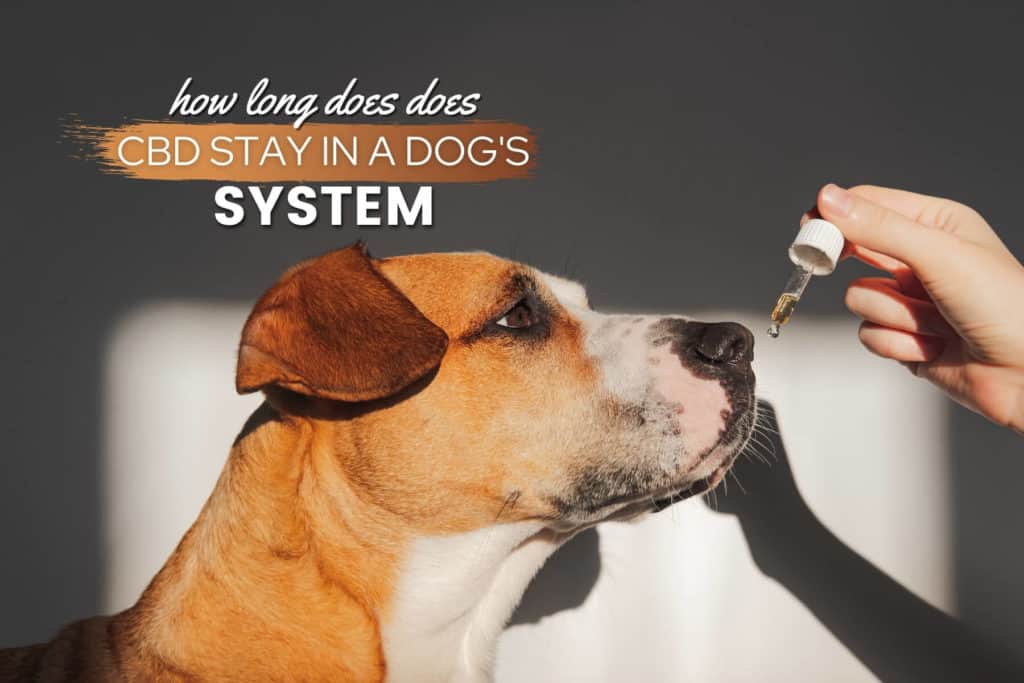What Is CBD Oil For Dogs? Benefits, Pros, Cons & Risks

Canine Bible is reader-supported. We receive affiliate commissions via some of our links. This doesn’t affect rankings. Learn more.
This is the most comprehensive guide to learning all about CBD for dogs.
If you’re like most dog owners, you want to do whatever you can to keep your furry friend healthy and happy. And if you’ve been hearing a lot about CBD oil for dogs lately, you may be wondering if it’s something worth trying.
CBD oil is becoming a more popular treatment for dogs with various issues. But what is CBD oil, exactly? And are these risks associated with using it on dogs? Does CBD really work? And is it safe? Here’s everything you need to know about CBD for dogs.
- What is CBD Oil?
- How Is CBD Oil Made?
- Is CBD Safe For Dogs?
- Benefits
- The Research Behind CBD
- How Does CBD Work In Dogs?
- Side Effects & Risks
- Overdose
- Pros & Cons
- Full-Spectrum vs Broad vs Isolate
- Dosage
- What To Look For
- Types of CBD Products
- How Long Before It Takes Effect?
- Evidence & Testimonials
- Dog CBD Oil vs Human CBD
- Frequently Asked Questions
- Conclusion
What Is CBD Oil For Dogs?
CBD oil is a natural hemp extract that has shown potential therapeutic health benefits for certain conditions in dogs and humans.
Short for cannabidiol, CBD is one of over 100 natural compounds found in Cannabis (marijuana or hemp plants).
Know that marijuana and hemp are simply terms to classify varieties of Cannabis depending on their THC content. Legally, the key difference between marijuana-derived CBD and hemp-derived CBD is the tetrahydrocannabinol (THC) content. Marijuana is a term used to classify varieties of Cannabis that contain more than 0.3% THC and as much as 30% THC, while “Hemp” is a term that classifies types of Cannabis that have a max of only 0.3% or less THC.
While marijuana is illegal in most states, hemp-derived oil is legal in all 50 U.S. states. All CBD oils for dogs are made from hemp plants. Hemp is the legal, non-intoxicating version of Cannabis and cannot cause a high.
CBD does not contain delta-9-tetrahydrocannabinol (THC), the chemical that gives marijuana its psychoactive properties. In simpler words, CBD will not get you or your dog “high.”
CBD oils are not toxic and may provide several health benefits for your dog without inducing psychotropic or euphoric effects on your pet.
What’s The Difference Between CBD Oil vs Hemp Oil For Dogs?
CBD Oil and Hemp Oil are not the same.
How Is CBD Oil For Dogs Made?
CBD oil for dogs is made by extracting CBD from the cannabis plant (marijuana or hemp) and then diluting it with a carrier oil like coconut or hemp seed oil.
The highest quality CBD oils are typically extracted using safe methods (solvents) such as carbon dioxide, ethanol, or cold press extraction. These solvents separate and collect the CBD, essential oils, lipids, and beneficial compounds from the stalks, flowers, and leaves of the cannabis plant. The solvent is removed from the final product, leaving a concentrated CBD oil.
Beware! Some companies may use cheap and potentially toxic solvents like propane, hexane, and butane to extract THC from the cannabis plant.
Is CBD Oil Safe For Dogs?
Can you give CBD oil to dogs? Is it safe for our canine friends and other pets?
According to a 2017 World Health Organization report, CBD appears safe and well-tolerated by animals.[1]
Most vets agree that CBD oil is safe if your dog is not given an intoxicating amount of THC (the psychoactive ingredient in marijuana).
CBD appears to be safe for dogs, based on available research.
There is also a great deal of anecdotal evidence regarding pet parents’ benefits of CBD use in their dogs on forums, social media and other platforms. We’ve also seen no reports of significant side effects or adverse health concerns from pet owners (or veterinarians, for that matter) using CBD oils or treats.
Nonetheless, you must talk to your vet before giving your dogs CBD.
Benefits Of CBD Oil For Dogs
Is CBD oil good for dogs? How can CBD oil help my dog?
If your dog suffers from the following conditions (occasionally or chronically), dog CBD oil or treats can improve your dog’s quality and ease several conditions, including:
The Scientific Research Behind CBD For Dogs
Veterinary scientists and researchers have demonstrated that CBD oil may help relieve many symptoms. While CBD is commonly recommended (or inquired about) for anxiety, arthritis, pain, and seizures, its benefits go beyond that.
Out of the hundreds of research studies, here are just a few that highlight the benefits of CBD.
Furthermore, 82.2% of 2,130 American veterinarians approved or strongly approved the medical use of CBD/hemp products for dogs in a 2019 survey. CBD was most commonly discussed by vets or pet owners for helping with pain, anxiety, seizures, storm or fireworks-related phobias, and gastrointestinal conditions.[10]
There is also considerable undeniable anecdotal evidence from pet parents about CBD’s positive benefits to their dogs.
Undoubtedly, CBD benefits dogs just as it is for humans. Nevertheless, more research is needed before we can draw any conclusions.
How Does CBD Work In Dogs? The Endocannabinoid System
The answer lies in your dog’s Endocannabinoid system. Humans, dogs, and all vertebrate animals (i.e., mammals, birds, amphibians, fish, and reptiles) have an endocannabinoid system (or ECS).
The ECS is part of all 11 major physiological systems of the body, and its primary role is balancing all other systems and promoting homeostasis. It’s responsible for building and maintaining human health and regulating various functions, including mood, appetite, memory, metabolism, sleep, pleasure, movement and coordination, immune response, and more.
The ECS is programmed to respond to endogenous cannabinoids produced by our bodies and external cannabinoid sources such as cannabidiol (CBD), allowing the active ingredients in hemp to help relieve many dogs’ symptoms.
CBD oil acts as a key that activates the endocannabinoid system to start its homeostatic and therapeutic functions, including modulation of pain, inflammation, movement, and all the health benefits mentioned above.
According to the National Institute of Health, manipulating the endocannabinoid system with an external cannabinoid like CBD oil could be beneficial in treating several medical ailments.[11]
A properly functioning endocannabinoid system is crucial for maintaining the health and wellness of your dog.
CBD Oil For Dogs Risks
Dr. Gary Richter, owner and medical director of Montclair Veterinary Hospital in Oakland, California, and author of “The Ultimate Pet Health Guide,” says that it is rare to see pets show adverse side effects when given the correct dosage.
CBD is not for every pet. Side effects potentially due to CBD treatment have been reported.[12]
Dr. McGrath says, “I would be a little concerned about giving CBD to a dog with known liver issues because CBD appears to be metabolized by the liver. You also need to be wary about giving CBD to a dog who already takes a medication metabolized by the liver. We don’t know these things interact right now.”
PetMD’s veterinary advisor, Dr. Jennifer Coates, points out that ingesting large amounts of marijuana has been fatal in several dogs, so preventing overdoses with cannabis-derived products such as CBD oil is important.[13]
Another big concern dog parents should keep in mind is quality control. The CBD market isn’t well regulated yet. CBD products could contain ingredients that aren’t listed on their labels, including THC, which is toxic to dogs.
The American Kennel Club states that there aren’t many scientific studies on the side effects of CBD oil on dogs and that it is important to consider how CBD oil affects people since the human and canine Endocannabinoid systems are essentially the same.
Side Effects of CBD Oil For Dogs
Some canine studies also noted increased liver enzyme alkaline phosphatase (ALP) during CBD treatment.
Can My Dog Overdose On CBD?
Dr. Richter warns that THC toxicity due to overdosing is the worst-case scenario that could endanger your pup. Essentially, your dog would get high, she says.
Overdosing will depend on the type of CBD product your pet is using. An overdose is highly unlikely if the product contains 0% or 0.3% or less THC. If your dog ingests a large amount of a CBD product or the CBD product has a higher percentage of THC, more elevated than usual, an overdose could occur.
CBD Oil Overdose Dog Symptoms
While some mild cases can be managed at home, others may require IV fluids and medical care.
If you suspect an overdose, contact your veterinarian immediately.
Pros And Cons Of CBD Oil For Dogs
Let’s look at the pros and cons of CBD oil for dogs.
Pros
Cons
Dog CBD Oil Types: Full-Spectrum vs Broad-Spectrum vs Isolate
These are the main types of CBD oil for dog consumption you will encounter:
Full Spectrum CBD Oil For Dogs
What is full-spectrum CBD oil for dogs? And how is it different from broad-spectrum and isolate CBD oil?
Full-spectrum CBD means your dog’s CBD oil contains CBD and other important cannabinoids that occur naturally in the cannabis plant, including CBC, CBN, CBD, CBG, and CBA. A full-spectrum CBD also contains terpenes (i.e., limonene, alpha-pinene). It is the most recommended and effective kind of CBD oil for dogs.
This mixture of CBD, other cannabinoids, and terpenes work synergistically to boost the medicinal benefit your dog receives from CBD oils and is known as the “entourage effect.”
Broad-Spectrum CBD Oil For Dogs
It’s pretty much the same as full-spectrum oil but with no HTC.
Isolate CBD Oil For Dogs
It’s purely CBD. This means the oil has no THC and lacks other cannabinoids and terpenes. It’s generally cheaper and has no flavor or odor.
So, which one should you pick? Is one better than the other?
While CBD oil isolate for dogs can be effective, full-spectrum or broad-spectrum CBD oil is usually preferred by veterinarians because of the added benefits from the “entourage effect” and terpenes. CBD overall works better when other cannabinoids are present. Next time you buy CBD oil for your pup, check the label of your CBD product to make sure it’s full-spectrum or broad-spectrum.
Dog Oil For Dogs Dosage
The amount of CBD oil you administer to your dog will vary by manufacturer. Remember, each bottle of CBD comes in different concentrations expressed in milligrams (mg).
Underdosing is preferred at first. Monitor your dog’s response; if everything seems to be going well, shift to the manufacturer’s dosing guidelines for your specific CBD oil. Most CBD oil companies for dogs will provide detailed dosing guidelines for their products.
Know that a clear and safe dosage level standard hasn’t been set by research, but you can learn more in our CBD dosage guide.
How Do I Find High-Quality CBD Oil?
Not all CBD products are the same. Here is what you need to look for when buying a CBD product.
Types of CBD Products Available For Dogs You Can Buy
While CBD oil is the most popular alternative for dogs, there are other ways your furry dude can get the benefits from CBD.
Dog CBD Oil
Dog CBD oils are taken beneath the tongue with a dropper, and it’s the most popular way to administer CBD to dogs. Compared to other dog CBD products, CBD oils have the fastest rate of absorption and efficacy because the oil enters the bloodstream directly when applied orally.
CBD oils can also be added to smoothies and foods which make them. We’ve created a thorough guide of brands that offer the best CBD oil made specifically for dogs. Read our best CBD oil for dogs review for more.
CBD Dog Treats
Administrating your dog’s oil through a tincture can sometimes be challenging for several reasons, including the dog won’t sit still, hates the smell or taste, or avoids opening his mouth. Whatever your reason, CBD dog treats can provide all CBD benefits in an enjoyable and tasty snack.
CBD Dog Treats are convenient and come in many irresistible flavors that your pup won’t know the difference between his favorite treat and medicine. The only difference between dog CBD treats and CBD oil for dogs is that edibles usually take longer to absorb as they have to be digested before the effects kick in.
Learn about CBD dog treats for dogs, including when to use them, dosages, the best CDB dog treats, and more in our guide.
CBD Oil Topicals For Dogs (Cream, Balms, Shampoos & Gels)
CBD topicals like balms for dogs are applied directly to the skin. This allows a localized relief effect.
If your dog needs constant relief during the day, these CDB balms or creams are a great option.
The main difference between CBD oil and topical is that the ladder is a transdermal treatment option meaning it does not reach the bloodstream; thus, its moderate benefits and effectiveness.
If your dog suffers from arthritis, muscle pain, joint pain, or skin allergies, administer a topical to provide localized pain relief and a soothing sensation. You can also use it with your current CBD oil treatment for more highly targeted support. Additionally, CBD dog shampoos can make bath time even more relaxing while helping keep your pet’s skin pampered and support a shiny, full coat.
CBD Capsules For Dogs
CBD capsules are just another way for your dog to consume and get the benefits of CBD. CBD pills for dogs are perfect for those dogs who dislike the flavor of the oil. You can administer it directly or with food.
The best CBD capsules for dogs will provide equally beneficial results to your pup, but it may take slightly more time to see the effect because the capsule has to dissolve once it enters your dog’s body.
Calculating CBD capsule dose for dogs should be simpler as each pill has a predisposed amount and potency.
CBD Spray For Dogs
CBD spray for dogs is not intended to be sprayed all over your dog. These spray bottles are designed to make it easier for parents to apply CBD to their dog’s food or beverage. Like CBD oils, you can find a variety of dog CBD topical sprays for skin, anxiety (calming), or any other health concern.
How Long Does It Take For CBD To Work On Dogs?

The reaction times of dogs to CBD oil vary depending on the condition you are treating.
When taken orally, you can start seeing CBD oil results for dogs as quickly as 5 to 30 minutes for things like situational anxiety. It can take as long as two weeks to see consistent improvement if you’re using it to treat arthritis or immune system issues.
Your brand and dosage amount will also impact how long CBD takes to work on your dog. If you don’t see a change or it’s taking longer than usual, you may need to tweak up slightly the CBD oil dosage.
CBD Oil For Dogs Evidence & Testimonials
Want more real evidence about the efficacy of CBD in treating different conditions in dogs?
Watch this short video on researchers studying the effectiveness of CBD for treating arthritis and epilepsy in dogs and how a dog named Tucker, suffering from right elbow arthritis, got cured thanks to Cannabidiol dogs.
Dog CBD Oil Testimonials
We scoured the internet and came across hundreds of dog parents praising CBD and how it’s done wonders for their dogs. Here are a couple of real testimonials we found.
Dog CBD Oil Evidence: CBD Oil Cures Dogs Seizures
Watch this quick video of CBD oil in action!
The benefits of CBD oil are amazing. You can use these products regularly to maintain the health of your pet dog. Using CBD oils correctly can make a massive difference in the life of an ill pup.
CBD Oil For Dogs Versus Human CBD
Is CBD oil for dogs and humans the same?
There is no significant difference in the CBD oils manufactured for humans or dogs. However, the dosage amount of human CBD tinctures. The main differences are the labeling standards imposed by the FDA, flavors available, and dosage amounts per bottle.
Can I Give My Dog Human CBD Oil?
You can technically give your dog human CBD oil for humans, but veterinarians strongly advise against this practice. CBD oil for people has different dosage levels, potencies (usually higher), and other ingredients that may not suit your pet. You may risk overdosing on your dog when giving human CBD oil.
It’s advised to give your dog what’s manufactured for them, not people, and vice versa.
CBD Oil For Dogs Frequently Asked Questions
Is CBD Oil For Dogs Worth It? Alternatives
CBD is a growing industry and trend among dog parents.
Despite the need for more testing, the current evidence suggests that CBD may benefit dogs. If you are looking for pain relief, sleep improvement, or help with more severe issues like seizures, CBD may be able to help.
Make sure you do your research before purchasing a CBD product. Always verify the third-party lab results and follow the dosing instructions carefully.
The ongoing research results are positive and promising for this new holistic medicine alternative. Don’t forget to run it through your vet if you are thinking about giving CBD to your dog.
Like It? Subscribe & Share!
Canine Bible authorship represents the unified voice of our entire editorial team and our in-house veterinarians rather than a single author. Each article, blog post, and review published under the Canine Bible name undergoes a rigorous review process, involving all team members to guarantee accuracy and up-to-date in accordance with the latest veterinarian research. This collaborative effort is an integral part of our editorial process and aligns with our four pillars of content creation. This approach ensures our content is backed by expert knowledge and factual information, offering our readers reliable, actionable, and trustworthy content.








![Dog Allergy Testing Cost: How Much Will You Pay? [Update 2024]](https://www.caninebible.com/wp-content/uploads/2022/08/how-much-does-dog-allergy-testing-cost-768x512.jpeg)


